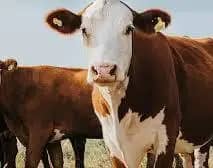By Stella Odueme
The Federal Ministry of Livestock Development has said that it aims to expand the livestock sector’s Gross Domestic Product (GDP) contribution from the current $32 billions to $74 billions by 2035, thus repositioning Nigeria as a key player in both domestic and international markets for animal protein similar to leading producers like Brazil, Argentina the United States (US).
The Minister of Livestock Development, Idi Maiha, who stated this at a ministerial press briefing on Friday in Abuja, organised by the Ministry of Information and National Orientation, said his Ministry has developed ten strategic pillars to boost production, improve animal health, guarantee food security, promote inclusivity and strengthen sector governance.
The Minister noted that one of the most significant outcomes of the international engagements spearheaded by Mr. President himself, was the Brazil-Nigeria trade mission, which secured a landmark $2.5 billion investment deal with JBS S.A.
“Nigeria aims to expand the livestock sector’s GDP contribution from $32 billions to $74 billions by 2035.
“This partnership will establish six large-scale meat processing plants for bee, poultry and pig production, create over 50, 000 direct and indirect jobs in Nigeria’s meat industry and enhance Nigeria’s participation in global livestock markets, increasing exports to the Middle Easy, Europe, and North Africa,” he said.
According to the Minister, collaborations with the United Kingdom and the US have focused on modern ranching, genetic improvement, and disease control, while engagements with Egypt, France, Saudi Arabia and Sweden are creating new market opportunities for exporting processed meat and
dairy products.
“The target by 2026, is to attract additional $5 billion investment to expand Nigeria’s meat and dairy processing industry, create over 100,000 new jobs across the livestock value chain and boost meat and dairy exports, enhancing Nigeria’s trade balance,” he said.
Maiha explained that the ministry has established seven key technical departments, and six common service departments to develop the policies and programmes needed to transform the livestock sector into a vibrant and sustainable one.
The Minister also disclosed of steps to address cattle rustling, theft and challenges in tracking animal movement through the establishment of a National Livestock Identification and Traceability System (NLITS).
He revealed plans to revamp grazing reserves across the country saying that the FG in partnership with the Borno State Government has inaugurated the first cattle ranch and resettlement centre.
According to him, the reserves will feature housing estates, schools, health clinics, veterinary services and modern dairy and beef processing facilities to boost agricultural productivity and economic growth.
“With more than 417 grazing reserves spanning over 5 million hectares, the government aims to transform these areas into economic hubs for beef production, dairy farming, and leather processing,” the minister stated.
The Minister also said that efforts are to top gear to modernize abattoirs across Nigeria to improve hygiene.
“Currently, many slaughterhouses operate below global hygiene standards, limiting Nigeria’s ability to export processed meat.
“Over the last seven months, the Ministry has had several engagements with investors, agribusiness firms, and livestock value chain actors to drive investments in establishment of farms, breed improvement and artificial insemination initiatives, expansion of feed and fodder production, input supplies, cold-chain logistics for safe transportation of packaged meat and dairy products and the modernisation of abattoirs and processing facilities to meet international standards.
“The government is working with sub-national entities and private investors to rehabilitate and expand meat processing facilities to meet export requirements,” he stressed.
Additionally, he said a 40-million-dose capacity solar-powered National Strategic Vaccine Storage facility located in the FCT has been commissioned to enhance disease prevention, improve livestock health and ensure food security.
He disclosed of plans to maximize the use of livestock byproducts, such as bones, hides, and horns, noting that proper processing of these materials could generate up to N23 billion while creating additional 700,000 jobs.
“Currently, the livestock sector contributes approximately 5% to Nigeria’s GDP. The ministry’s ambitious goal is to double this contribution through policy reforms, investments, and increased production. Strategies include increasing milk yields from the current 2 liters per cow per day to at least 30 liters and improving beef cattle growth rates to reach market weight within two and a half years.
“We are embarking on a massive genetic upgrade of our livestock to boost productivity.
“This will be achieved through methodical improvements in breeding, animal health, and feed production. Our goal is to move from subsistence to commercial-scale operations, ensuring that Nigeria becomes a major player in global livestock trade,” the said.
Earlier in his welcome address, the Minister of Information and National Orientation, Mohammed Idris, said the aim of the 2025 ministerial press briefing is to keep Nigerians abreast of government policies and programmes.
“This is one of the efforts of the Bola Tinubu’s administration to ensure that Nigerians are always informed accurately, honestly, as transparently as possible about all programs and policies of government.”



